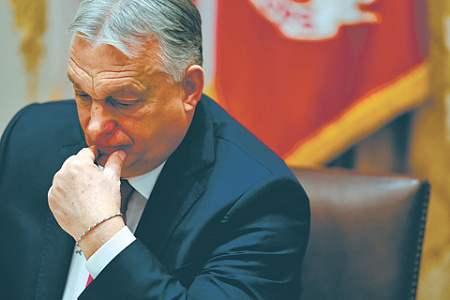
Hungarian Prime Minister Viktor Orbán has ignited a fresh diplomatic firestorm, asserting that the United States has pledged to safeguard Hungary’s financial stability and provide indefinite exemptions from sanctions on Russian energy imports. These extraordinary claims, made following recent talks with former US President Donald Trump, have been met with skepticism and outright contradiction from the White House and the European Union, casting a long shadow over the future of Budapest’s relations with its Western partners.
Speaking to journalists on his return flight to Budapest last week, Orbán declared that Trump had promised a ‘financial shield’ for Hungary should its currency, debt, or credit rating come under external attack, particularly from Brussels. This alleged agreement, Orbán suggested, would empower Hungary to pursue its strategic goals without fear of financial coercion from the EU, which has frozen significant funds to Budapest over rule-of-law concerns. Such a guarantee would be critical for Hungary, which has frequently accused the European Commission of threatening the national currency, the forint, as a means of pressure.
Adding another layer of controversy, Orbán also claimed that Trump had granted Hungary an indefinite waiver from US sanctions on purchasing Russian oil and gas. This assertion directly clashes with Washington’s stated position. Reuters, citing a White House official, reported that any such exemption granted to Hungary was limited to one year. Despite this, Hungarian Foreign Minister Péter Szijjártó reiterated Orbán’s claim on social media, insisting on an agreement for a permanent exemption.
The meeting between Orbán and Trump, held on November 7th, was characterized by an unusual degree of ambiguity. While both leaders sought to project an image of ideological alignment and mutual respect, the practical outcomes and official interpretations diverged significantly. The White House did not corroborate Orbán’s specific claims regarding either an extensive US financial safety net or an open-ended energy waiver, leading to an information vacuum that has fueled speculation and diplomatic tensions.
Brussels was quick to weigh in, with the European Commission making it clear to Hungarian media that any bilateral agreement between Hungary and the United States would have no bearing on the EU’s overarching strategy to completely phase out Russian energy imports by 2027. This definitive stance from the EU’s executive body underscores the bloc’s resolve and effectively nullifies Orbán’s perceived diplomatic victory regarding Russian energy, signaling that Hungary will still be expected to comply with the EU’s collective energy transition timeline.
Domestically, Orbán’s political opponents have seized upon the discrepancies, portraying the perceived ‘agreements’ as a public relations facade designed to mask diplomatic setbacks. Péter Magyar, leader of the opposition Tisza Party and a prominent critic, accused the Prime Minister of making one-sided concessions, such as pledges to purchase American weaponry and liquefied natural gas, without securing promised American investments or an agreement on double taxation. Magyar lambasted Orbán, stating that he and his entourage were ‘selling Hungary’ on the international stage, suggesting a failure to truly advance national interests despite the fanfare.
